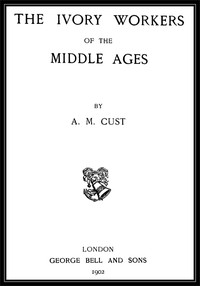The Ivory Workers of the Middle Ages by Anna Maria Elizabeth Cust
"The Ivory Workers of the Middle Ages" by Anna Maria Elizabeth Cust is a historical account written in the early 20th century. The book explores the artistry and craftsmanship of ivory workers from the early Christian era through the Middle Ages, detailing their works and the cultural significance of ivory carvings during this period. It aims to provide insights into the continuity and evolution of art despite the political and social upheavals
following the fall of the Roman Empire. At the start of the book, the author emphasizes the importance of ivory as a material throughout history, from prehistoric times to the medieval period. The opening chapters introduce the concept of diptychs—carved tablets used for various purposes, including religious ones—and discuss their role in the cultural fabric of that time. The narrative highlights significant examples of consular diptychs and various styles of ivory carvings that illustrate the transition from classical art to a more medieval form, reflecting on how these artworks encapsulate the historical shifts between the ancient and medieval worlds. (This is an automatically generated summary.)
Read or download for free
| How to read | Url | Size | |||
|---|---|---|---|---|---|
| Read now! | https://www.gutenberg.org/ebooks/58752.html.images | 318 kB | |||
| EPUB3 (E-readers incl. Send-to-Kindle) | https://www.gutenberg.org/ebooks/58752.epub3.images | 3.3 MB | |||
| EPUB (older E-readers) | https://www.gutenberg.org/ebooks/58752.epub.images | 3.3 MB | |||
| EPUB (no images, older E-readers) | https://www.gutenberg.org/ebooks/58752.epub.noimages | 171 kB | |||
| Kindle | https://www.gutenberg.org/ebooks/58752.kf8.images | 3.4 MB | |||
| older Kindles | https://www.gutenberg.org/ebooks/58752.kindle.images | 3.4 MB | |||
| Plain Text UTF-8 | https://www.gutenberg.org/ebooks/58752.txt.utf-8 | 236 kB | |||
| Download HTML (zip) | https://www.gutenberg.org/cache/epub/58752/pg58752-h.zip | 3.7 MB | |||
| There may be more files related to this item. | |||||
Similar Books
About this eBook
| Author | Cust, Anna Maria Elizabeth |
|---|---|
| LoC No. | 02019564 |
| Title | The Ivory Workers of the Middle Ages |
| Series Title | Handbooks of the great craftsmen |
| Credits |
Produced by deaurider, Paul Marshall and the Online Distributed Proofreading Team at http://www.pgdp.net (This file was produced from images generously made available by The Internet Archive) |
| Reading Level | Reading ease score: 59.2 (10th to 12th grade). Somewhat difficult to read. |
| Language | English |
| LoC Class | NK: Fine Arts: Decorative and Applied Arts, Decoration and Ornament |
| Subject | Ivories, Medieval |
| Subject | Ivories -- History |
| Category | Text |
| EBook-No. | 58752 |
| Release Date | Jan 22, 2019 |
| Copyright Status | Public domain in the USA. |
| Downloads | 287 downloads in the last 30 days. |
| Project Gutenberg eBooks are always free! | |

